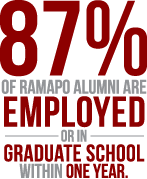College Catalog: 2010-2011
School of Social Science and Human Services (SSHS): Psychology (B.A.)
Website: School of School of Social Science and Human Services
Convener:
Faculty:
Psychology seeks to understand human cognition, emotion, experience, and behavior. The Psychology Program at Ramapo College educates students in both the science and profession of psychology. It teaches psychology in a liberal arts context that makes clear the interconnections between psychology and other disciplines and promotes critical reasoning skills.
The program nurtures learning by immersing students in a variety of theoretical orientations, research methodologies, and human diversity issues. Students also gain hands-on experience in the practice of psychology through fieldwork or through an independent research project. Students are trained to appropriately apply their psychological knowledge to issues in the world and to become discriminating readers of social and behavioral research. Students who are interested in graduate school are encouraged to participate in independent research under the guidance of a faculty member.
To attain these goals, the program requires that students complete three basic courses: Introduction to Psychology, Research Methods in Psychology and Data Analysis in Psychology. The remaining requirements are structured around a number of courses that are grouped into six categories. Students are required to take at least one course from each of these categories. This structure allows some flexibility and choice, yet insures that each student will be exposed to content in the areas of social, developmental, experimental, and personality/abnormal psychology. Majors also take a course that presents a cultural or historical perspective on the discipline and an elective course in psychology.
Students gain hands-on, applied experience in psychology through a fieldwork course or an independent research course. In fieldwork courses students generally work in a mental health or educational agency in the community such as a school for special children; in the independent research course they design and implement a piece of original research. The final psychology requirement is a 400-level seminar in the senior year: Advanced Topics in Psychology. Examples of these include “Black Issues in Psychology,” “Psychopathy,” and “Cults.”
Psychology is an appropriate major for a student seeking a career in any one of the human-service professions and for a student planning graduate work in psychology. Graduates may find opportunities for employment in a variety of settings such as community mental health centers, counseling services, substance-abuse programs, geriatric facilities, probation services, and schools for special education. Other opportunities lie in the fields of advertising, consulting, consumer research, criminal justice, education, environmental policy, evaluation research, human factors engineering, marketing, personnel, and product planning.
The psychology major is offered by the School of Social Science and Human Services leading to a B.A. degree. A psychology minor is available.
- Transfer students who have 48 or more credits accepted at the time of transfer are waived from the courses marked with a (W) below. Waivers only apply to General Education Requirements NOT School Core or Major Requirements.
- Double counting between General Education, School Core, and Major may be possible. Check with your advisor to see if any apply.
- Subject & Course # – Title & Course Description
- GENERAL EDUCATION REQUIREMENTS
- INTD 101 - FIRST YEAR SEMINAR (W)
- ENGL 180 - COLLEGE ENGLISH
- AIID 201 - READINGS IN HUMANITIES (W)
- MATH 108 - ELEMENTARY PROBABILITY AND STATISTICS
- SELECT ONE – GE-SCIENCE WITH EXPERIENTIAL COMPONENT CATEGORY
- SELECT ONE – (W) GE-HISTORY CATEGORY: HIST 101-110
- SELECT ONE – GE-INTERCULTURAL NORTH AMERICA CATEGORY
- SELECT ONE – GE-INTERNATIONAL ISSUES CATEGORY
- SELECT ONE – (W) GE-TOPICS ARTS AND HUMANITIES CATEGORY
- SCHOOL OF SOCIAL SCIENCE AND HUMAN SERVICES REQUIREMENTS
- SOSC 101 - SOCIAL ISSUES
- SOSC 235 - HISTORY OF SOCIAL THOUGHT
- SELECT ONE – Sustainability course from the following:
- ENSC 325 - BIOLOGICAL CONSERVATION
- ENSC 327 - ECOLOGICAL AGRICULTURE
- ENST 207 - PUBLIC POLICY
- ENST 209 - WORLD SUSTAINABILITY
- ENST 215 - ENVIRONMENTAL HISTORY
- ENST 312 - ECOLOGICAL ANTHROPOLOGY
- ENST 313 - APPROPRIATE TECHNOLOGY
- ENST 335 - ECOLOGY, SOCIETY, AND THE SACRED
- ENST 338 - SUSTAINABLE COMMUNITIES
- ENST 390 - TOPICS:
- GEOG 303 - WATER RESOURCES
- GEOG 304 - FOREST RESOURCES
- INTD 250 - SUSTAINABILITY SEMINAR
- PSYC 343 - ENVIRONMENTAL PSYCHOLOGY
- SOCI 235 - COMPARATIVE DEVELOPMENT
- SOCI 306 - ENVIRONMENTAL SOCIOLOGY
- SOCI 309 - FOOD AND POPULATION
- PSYCHOLOGY MAJOR REQUIREMENTS
- PSYC 101 - INTRODUCTION TO PSYCHOLOGY
- PSYC 303 - RESEARCH METHODS IN PSYCHOLOGY
- PSYC 304 - DATA ANALYSIS IN PSYCHOLOGY
- SELECT ONE – OF THE FOLLOWING ADVANCED TOPICS:
- PSYC 430 - ADVANCED TOPICS IN PSYCHOLOGY
- PSYC 431 - ADVANCED TOPICS IN PSYCHOLOGY: CHILD ABUSE AND NEGLECT
- PSYC 432 - ADVANCED TOPICS IN PSYCHOLOGY: PSYCHOLOGY OF CULTS
- PSYC 433 - ADVANCED TOPICS IN PSYCHOLOGY: PSYCHOPATHY
- SELECT AT LEAST ONE COURSE IN EACH OF THE CATEGORIES BELOW (TOTAL 6)
- Category 1
- PSYC 226 - SOCIAL PSYCHOLOGY
- PSYC 343 - ENVIRONMENTAL PSYCHOLOGY
- PSYC 345 - INDUSTRIAL AND ORGANIZATIONAL PSYCHOLOGY
- Category 2
- PSYC 211 - THEORIES OF PERSONALITY
- PSYC 310 - NEUROPSYCHOLOGY
- PSYC 314 - ABNORMAL PSYCHOLOGY
- Category 3
- PSYC 202 - PSYCHOLOGY OF LEARNING
- PSYC 209 - PSYCHOLOGY OF PERCEPTION
- PSYC 227 - COGNITIVE PSYCHOLOGY
- PSYC 245 - BEHAVIORAL NEUROSCIENCE
- PSYC 305 - ETHOLOGY: ANIMAL BEHAVIOR
- PSYC 330 - DRUGS AND BEHAVIOR
- PSYC 353 -
- PSYC 366 - BEHAVIOR THERAPY
- Category 4
- PSYC 212 - PSYCHOLOGY OF AGING
- PSYC 241 - DEVELOPMENTAL PSYCHOLOGY
- PSYC 263 - CHILD PSYCHOLOGY
- PSYC 347 - ADOLESCENT PSYCHOLOGY
- Category 5
- PSYC 220 - THE PSYCHOLOGY OF YOGA
- PSYC 231 - MULTICULTURAL PSYCHOLOGY
- PSYC 235 - DEVELOPMENT OF SEXUAL IDENTITIES: LGBT
- PSYC 239 - CROSS CULTURAL PSYCHOLOGY
- PSYC 306 - ETHICAL AND LEGAL ISSUES
- PSYC 311 - PSYCHOLOGY OF GENDER
- PSYC 317 - PSYCHOLOGY OF RACISM
- PSYC 328 - FREUD, RACE AND GENDER
- PSYC 349 - PSYCHOLOGY OF WOMEN
- PSYC 365 - EVOLUTIONARY PSYCHOLOGY
- PSYC 413 - PHILOSOPHICAL ROOTS OF PSYCHOLOGY
- PSYC 423 - HISTORY AND SYSTEMS OF PSYCHOLOGY
- Category 6
- INTD 248 - PEER FACILITATION FIELDWORK
- PSYC 319 - ADULT PSYCHOLOGY FIELDWORK
- PSYC 320 - ABNORMAL PSYCHOLOGY FIELDWORK
- PSYC 337 - FIELDWORK IN AIDS & HIV
- PSYC 339 - FIELDWORK WITH ADOLESCENTS
- PSYC 358 - CHILDHOOD DISORDERS FIELDWORK
- PSYC 367 - FIELDWORK WITH CHILDREN
- PSYC 403 - INTEGRATIVE FIELDWORK: SUBSTANCE ABUSE
- PSYC 422 - BEHAVIOR THERAPY FIELDWORK
- PSYC 472 - INDEPENDENT RESEARCH
- SELECT ONE – ELECTIVE COURSE IN PSYCHOLOGY
- Any psychology course can count as an elective, including the following which are not in categories:
- PSYC 215 - LEARNING, COGNITION, AND TEACHING
- PSYC 218 - FORENSIC PSYCHOLOGY
- PSYC 242 - STATISTICS
- PSYC 251 - SUBSTANCE ABUSE
- PSYC 315 - INTEGRATIVE CASE MANAGMENT
- PSYC 326 - LOVE AND SEXUALITY
- PSYC 336 - COUNSELING SUBSTANCE ABUSERS I
- PSYC 338 - COUNSELING SUBSTANCE ABUSERS II
- PSYC 357 - CHILDHOOD DISORDERS
Note: A 2.0 GPA in the major is required for graduation.
- Subject & Course # – Title & Course Description
- Required Courses:
- PSYC 101 - INTRODUCTION TO PSYCHOLOGY
- Three Psychology courses (each selected from a different category)**
- One additional course selected from psychology categories or psychology electives**
- **Categories and electives are listed under Requirements of the Major
Note: A school core is NOT required for completion of the minor. Minors are open to students regardless of school affiliation.
General Education Requirements
Graduation Requirements
School of Social Science and Human Services Website
Faculty Profiles






